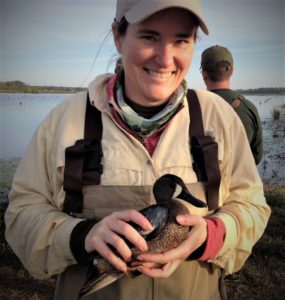NEWS
USFWS honors Maness for conservation work
Louisiana Tech’s Dr. Terri Maness, Associate Professor and Environmental Science Program Coordinator, received a 2019-2020 US Fish and Wildlife Service Regional Director’s Conservation Partner Award for her work with the Gulf of Mexico Avian Monitoring Network (GoMAMN) team. GoMAMN is group of conservation professionals who came together after the Deepwater Horizon Oil Spill with the aim of coordinating efforts to develop and implement a Gulf-wide avian monitoring program.
 The award ceremony was held virtually June 16.
The award ceremony was held virtually June 16.
“I feel strongly that one of the most important things I do as Regional Director is to honor the hard work and accomplishments of our employees and trusted partners,” said Leopoldo Miranda-Castro, Director of the South Atlantic-Gulf and Mississippi Basin Regions. “Conservation partner awards acknowledge significant contributions and willingness to work with the Service toward the conservation of natural resources in the Southeast. Together, our conservation efforts multiply far beyond what any one of us can do alone.”
Maness and GoMAMN were nominated for the award by USFWS Gulf of Mexico Migratory Bird Coordinator Jeffrey Gleason because the team “provides key information and real-time results to efforts to restore the Gulf and conserve and protect at-risk species,” he said.
The group recently published the book Strategic Bird Monitoring Guidelines for the Northern Gulf of Mexico, which is intended to advise stakeholders on how bird populations respond to conservation actions and underlying ecological processes. Maness co-authored a chapter in the guidelines concerning avian health and serves as chair of the Avian Health Working Group and co-chair of the Seabird Working Group.
“It was an honor to be nominated and extremely gratifying to have our work recognized with this award,” Maness said. “We published the guidelines to help coordinate bird-habitat conservation efforts so that we move forward using best practices. Birds in the Gulf region are at high risk of acute and chronic exposure to pollutants and stressors such as hurricanes and climate change. Monitoring the health of birds helps us understand the effects of these threats and how birds respond to restoration and management actions. Birds are also excellent indicators of the health of the environment, which can inform us about potential threats to human health and community resilience to disturbances in the region.”
Maness and her students are currently investigating the accumulation of heavy metals in the tissues of wintering waterfowl, landbird responses to restoration of Shortleaf Pine Woodlands, and the interaction between stressors and the immune system of seabirds. Maness also works with the Lower Mississippi Valley Joint Venture’s Environmental Outcome Monitoring Working Group to help evaluate environmental outcomes of management actions.
For more information about the Regional Director’s Honor Award recipients and a recording of the virtual Award Ceremony: https://www.fws.gov/southeast/regional-director-honor-awards-2021/
For more information about GoMAMN, please visit: https://gomamn.org/